Protection Against Electrostatic Discharge (ESD)
DFI Industrial-grade motherboards raise the bar in terms of protecting customers’ devices, providing premiere electrostatic discharge (ESD) protection for all I/O ports. In alignment with the IEC 61000-4-2 regulation by the IEC Association, over 8,000 volts of electricity are used to verify that DFI’s product will not be affected by an ESD event and will remain dependable even in uncontrolled circumstances. DFI leads the industry with strict ESD testing, including rigorous voltage and frequency testing, enabling the I/O ports to withstand a transient voltage of 8kV; unmatched by competitive offerings.








,有助於車隊管理員管理駕駛行為、運動感測、急煞車和衝擊偵測.jpg?timestamp=1689918406.42007)









R1w600.png?timestamp=1610692858.00854)
R2_W600.png?timestamp=1606708894.56453)
_w600.png?timestamp=1657001240.22922)
_w600.png?timestamp=1591777388.46748)